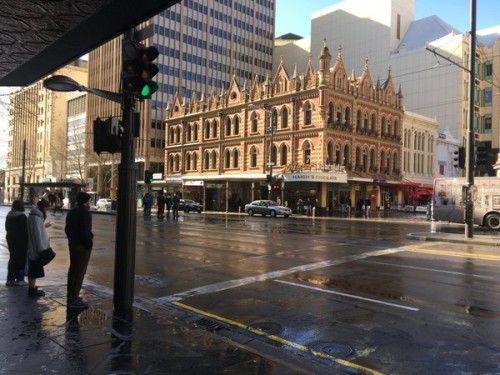
So, I rolled into Adelaide airport at 8 pm on Sunday night, after a long flight from London via Dubai. On the plane I alternated between sleeping, working, and listening: of late, I have taken to listening to music on flights. Usually, new planes with decent in flight entertainment have a good selection, and if you bring your own headphones you can hear the music quite well. It’s a good chance to explore new stuff, and also revisit old favourites, as well as filling in gaps of things you really should know but you don’t.
On that subject, schools should teach music better. At school, we had formal music lessons as part of the curriculum until age 16, but they steadfastly ignored anything that wasn’t classical. Even jazz and blues didn’t get a look in. Our music master was pretty brutal, too. We were all scared of him, and he pulled stunts like getting us to each stand up and sing solo in front of the rest of the class. Being asked to sing ‘Early one morning just as the sun was rising,’ in a breaking teenage voice in front of your peers is worse than having teeth drilled without anaesthetic, at least in terms of the fear it induces. We need School of Rock!
I shared a cab to the hotel with Reinhard Töpfer, who is a well known grapevine breeding expert from Germany. Our cab driver, it turned out, seemed to be quite interested in wine science.
He began by telling us about a recent experience he had with a 20-year-old bottle of Penfolds Magill Estate Shiraz. He opened it, and poured it, and it was very light in colour. He was disappointed, so he poured it into a decanter and came back a couple of hours later. It had regained its colour, and he very much enjoyed it.
He wanted to know why this happened, and the explanation he’d previously received concerned the effects of oxygen. I guess the story would be that anthocyanins are able to change their form, and that some forms are colourless and some coloured. Many years in bottle might cause the anthocyanins (which will all be complexed, no longer free) to largely be in a colourless state, and then when they are exposed to oxygen, they recover to the coloured state.
More was to follow. When I told Reinhard that I’d be speaking about terroir, the driver suddenly piped in: ‘I think terroir is so important,’ he said. He explained how he thought he could tell the difference between wines grown on different soils, and that if we gave him wines from McLaren Vale, or Barossa, or Coonawarra, he could spot the difference reliably. I had no reason to disbelieve him.
‘It’s because of the taste of the soil in the wines,’ he said. When he goes to these regions, he reaches down, grabs a handful of soil, and he can then smell it in the wine.
I just love that a regular wine consumer is so interested by wine, and concepts of terroir. I’m not sure I agree so strongly with his notion that you get to taste the soil in the wine: the influence of the soil is important, but it is an indirect one. But I enjoyed listening to a taxi driver with such an interest in the science of wine. If this is reflective of the general interest level of wine among Australian consumers, then the future of Aussie wine in the domestic market is bright indeed.
3 Comments on In Adelaide: discussing wine science with a taxi driver
South Australians will tell you the taxi driver is not a reflection of Australian wine consumers, but rather of South Australian wine consumers! 😉
(I’m South Australian so I’m allowed to say that!)
I’m glad you picked up on this. I lived in and around Adelaide for 18 months way back in 2003-2005 and it still remains by far the best wine town I’ve ever known. So much choice, so much interest, so many tastings! Did you get to go to “The Ex”?
The music teacher was Eggie Holmes. I too had to sing the same song as a solo – even though I am significantly younger than you: he obviously didn’t alter his curriculum much.